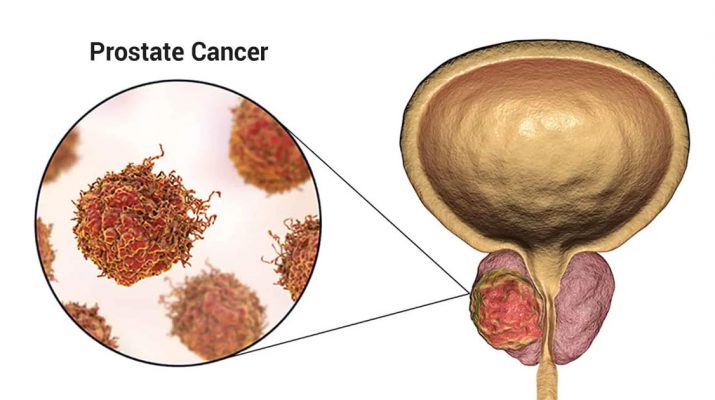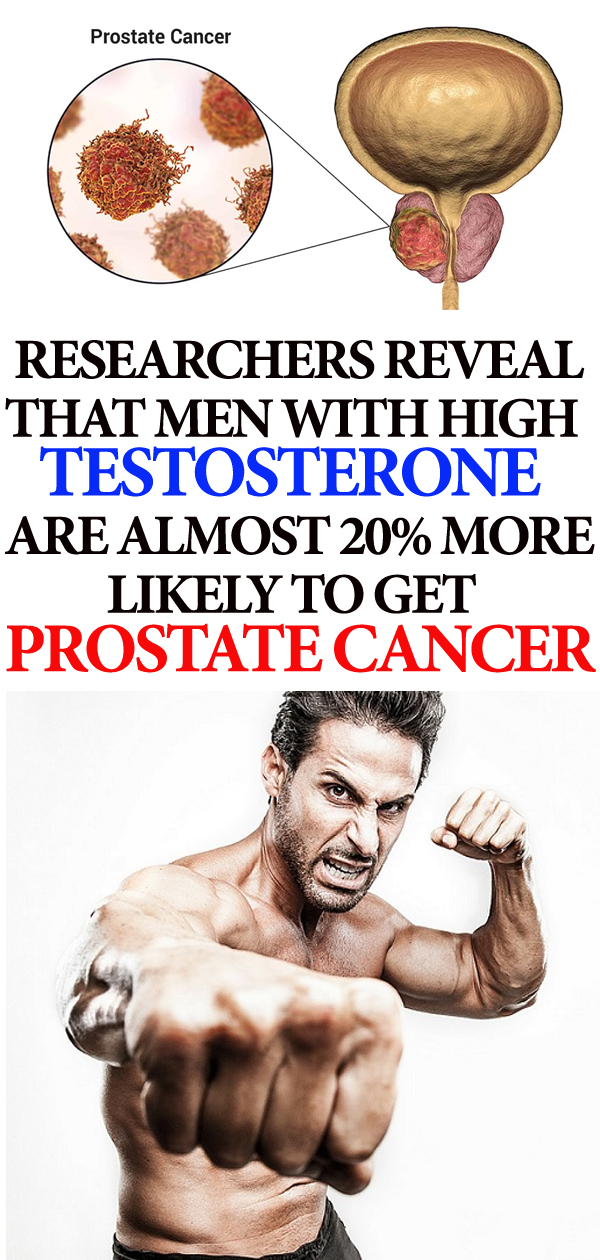Prostate cancer, following after lung cancer, is the second leading cause of cancer deaths among men. Only exceeded by skin cancer, this condition is the second most diagnosed cancer in men.
- Men with a diagnosis of prostate cancer are 1 out of 9
- 1 out of 41 men dies from the disease.
- The American Cancer Society estimates that about 174,650 men received a diagnosis of prostate cancer in 2019, and 31,620 died of the disease
For years, there has been a discussion of the role testosterone plays in the diagnosis of men with this disease. In a British study, researchers reveal that men with high testosterone are almost 20% more likely to get prostate cancer.
What Is The Prostate Gland, And What Does It Do?
The prostate gland is located under the bladder and in front of the rectum. It is a walnut-shaped gland that grows in size as men age. The seminal vesicles, which make the fluid for semen, sit behind the prostate. The urethra goes through the center of the prostate gland. The urethra is what carries the urine and the semen out of the body via the penis.
Types Of Prostate Cancer
While there can be multiple forms of cancer that form in the prostate, the vast majority of these cases are adenocarcinomas. These cancer cells form from cells of the gland that make the prostate fluid that is added to the semen. This diagnosis is what is found often in prostate cancer. According to the American Cancer Society, other possible, yet very rare, diagnoses include:
- Small cell carcinomas
- Neuroendocrine tumors
- Transitional cell carcinomas
- Sarcomas
Typically, doctors do not consider this to be a fast-growing cancer. Only in a few cases does this disease spread quickly. It is even not unusual for a man who has passed away due to other causes, to have prostate cancer found despite no symptoms or previous diagnosis.
What Are The Possible Pre-Cancerous Conditions For Prostate Cancer?
A man may develop the condition(s) that warrant further investigation, monitoring, or a biopsy due to the potential of leading to prostate cancer.
-
Prostatic Intraepithelial Neoplasia.
This condition comes in two possible stages. It is recognized by a change in how the cells of the prostate appear through a microscope. These changes do not indicate growth in other areas of the prostate, as is common in cancer.
- The low-grade stage has the cells appear mostly normal. This stage is not considered pre-cancerous.
- High-grade stage is when the cells do have an abnormal appearance. This stage is indicative of an increased risk of cancer.
-
PROLIFERATIVE INFLAMMATORY ATROPHY.
In this condition, the cells of the prostate will look smaller, and with signs of inflammation surrounding the area.
- There is a possibility of this being a precursor to high grade prostatic intraepithelial neoplasia or directly to prostate cancer.
Symptoms, Risk Factors And Complications Of Prostate Cancer
It is essential to be able to recognize potential signs and risk factors of prostate cancer. If diagnosed, it’s also wise to be aware of possible complications.
As with many cancers, prostate cancer may not show any symptoms in the early onset. This is why getting screening tests are essential. While screening tests are not always accurate, the earlier cancer is detected, the better the odds are of recovery.
Symptoms Of Prostate Cancer
In the later stages of prostate cancer, a man may experience symptoms of:
- Difficulty urinating or less force in the urine stream
- Semen may show blood
- The pelvic area is uncomfortable
- Erectile dysfunction
- Bone pain
Risk Factors For Prostate Cancer
The risk factors of prostate cancer are primarily related to genetics but do have other considerations:
- With age, your risk increases
- African American men tend to have a higher risk, and it may be more aggressive
- Genetic history of prostate cancer or breast cancer
- Being overweight also contributes to the aggressiveness of the disease as well as to its difficulty in treatment.
Complications Of Prostate Cancer
Specific difficulties accompany having prostate cancer and its treatment:
- Cancer always has a chance to spread. Preventing the spread of cancer depends upon early diagnosis and treatment. If it does spread, it can be managed, but a cure is less likely.
- In both the treatment and the disease, incontinence is a possibility. Treatment can be medications, catheters, or surgery depending upon the severity.
- Erectile dysfunction may also be a complication of the disease and treatment. Alternatives to treat ED may include vacuum devices or surgery.
Testosterone And Prostate Cancer: Friends Or Foes?
Scientists have been attempting to discover if there is a link between testosterone in men and prostate cancer. One consistent connection is that men with naturally less testosterone have a decreased chance of getting prostate cancer. Oddly enough, however, if they are diagnosed with prostate cancer, it tends to be a more aggressive form.
What Is Testosterone?
Testosterone is widely considered a male hormone, although women manufacture it as well. In comparison, a woman’s testosterone level is 1/10th – 1/20th of a man’s. Testosterone is considered an androgen, or steroid. Primarily, the testes produce it, while the hypothalamus and pituitary gland control its production. Essentially, the brain tells the testes how much to produce.
Testosterone is as important to male health as estrogen is to a woman’s health. It is responsible for:
- The development of the man’s penis while an embryo,
- Creates puberty changes such as deepening voice, increasing penis and testes size, and facial and body hair.
- A factor in sex drive,
- Maintaining muscle strength and mass,
- Red blood cell production,
- The production of sperm
- Fat distribution in the body.
- Possibly prevent osteoporosis in men
Testosterone As A Contributing Factor In Prostate Cancer
A recent study was performed at the Nuffield Department of Population Health at the University of Oxford in Britain. Dr. Ruth Travis led it.
Researchers studied more than 200,000 British men. The results indicated that men with higher levels of naturally produced testosterone were 18% more likely to develop prostate cancer. That is when they compared the group with men of naturally lower levels of testosterone.
A second hormone, called IGF-I, was also an indicator. IGF-1 is the acronym for insulin-like growth factors. IGF-I is a hormone naturally processed by the body. Its job is to regulate the effects of your growth hormone. Men from the study that showed higher levels of this hormone had a 25% higher risk of developing the disease in comparison to those with lower levels.
In this study, a research team selected over 200,000 men from the UK Biobank genetic database. They were all free from cancer at the beginning of the study. The study took place over seven years, and in that time, 5400 of the men developed prostate cancer, and 300 died from it.
The scientists speculate that since both hormones encourage cell growth in the prostate, the increase of cell development raises the risk of mutations in the cells themselves. Those mutated cells then also replicate, developing into cancer cells and spreading.
The researchers expect to present this study at the National Cancer Research Institute in Glasgow.
An Important Takeaway From The Research Team
One of the critical indirect facts to take away from this is that it is possible to decrease the growth hormone, IGF-I, through diet naturally. Men who are on vegan diets show a decrease in the growth hormone. Maintaining a low-fat diet that is high in fruits and vegetables has also shown to aid in decreasing the risk of cancer. Additionally, men who tend to eat less dairy also have a reduced risk of developing prostate cancer.
Final Thoughts On The Connection Between Prostate Cancer And High Testosterone
Continuing to study variables that contribute to the condition is instrumental in developing more accurate tests to diagnose prostate cancer early. Currently, many men do not request screening for prostate cancer until they are already showing progressive symptoms that could be related to the disease. By researchers finding that men with naturally high testosterone are almost 20% more at risk, doctors can be more informed.
Prostate cancer has a good prognosis for a cure if it is found early, and fortunately, most are cured. Yet the cause for the disease is still unknown. Researchers and scientists must continue to look at different angles to discover its cause. This study from Britain is an excellent example of this.


